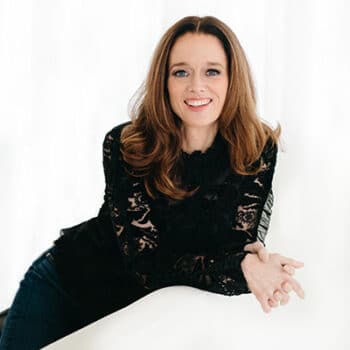I’m telling you, this woman, is a kind of brilliant and her words never fail to ignite. Leslie Leyland Fields is my sister-friend who works the Alaska ocean with her husband and six children as we work the Canadian fields—with our hands and our hearts. There, her 38 salmon-fishing seasons off a wilderness island have taught her much about what it means to follow Jesus. In this excerpt from her newest book, Crossing the Waters: Following Jesus through the Storms, the Fish, the Doubt and the Seas, Leslie is out in the fishing boat with her daughter wondering if teaching her to fish was a mistake. It’s a grace to welcome Leslie to the farm’s front porch today…
guest post and photos by Leslie Leyland Fields
I am out tonight on the ocean with my daughter, Naphtali, 25.
It’s a slow night on the water. I’m thankful.
I don’t have the energy tonight for battling high seas or too many fish.
I want to focus on her, on this time together.
Since she left home in Kodiak, Alaska for college eight years ago, our days together are few.
I look around me. Not many fish likely tonight, but it’s a jellyfish night, or rather, a jellyfish week. The ocean is thick and mucus-y with them, these Aurelia aurita, moon jellyfish, the clear kind that look like ocean water plus Knox Gelatin, with a little hyphenated cross as its entrails.
Their omnipresence doesn’t stop the work.
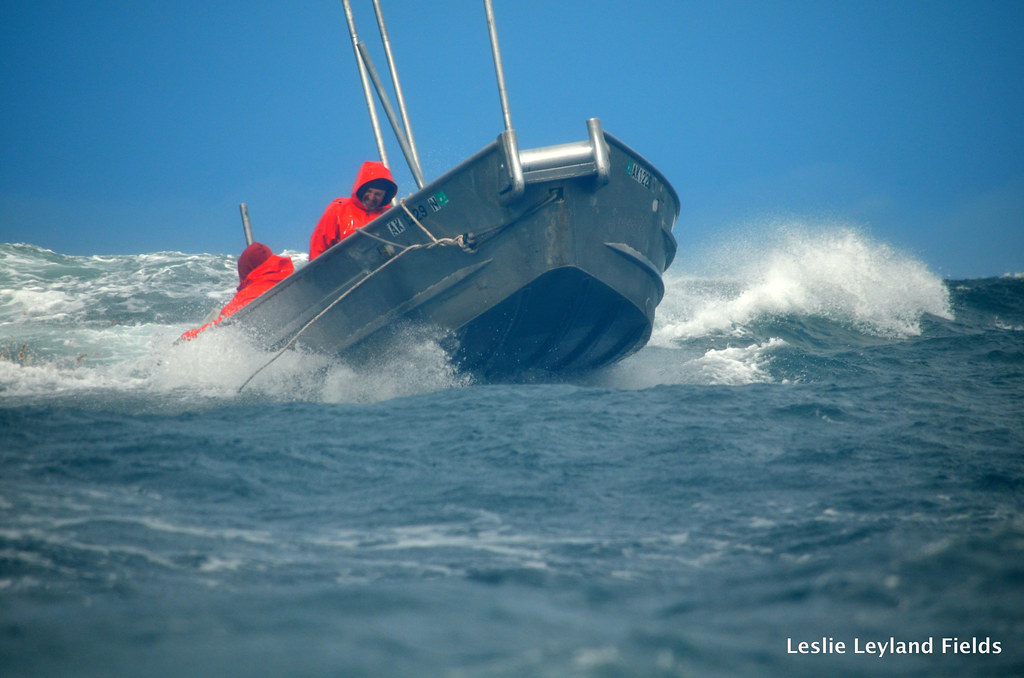
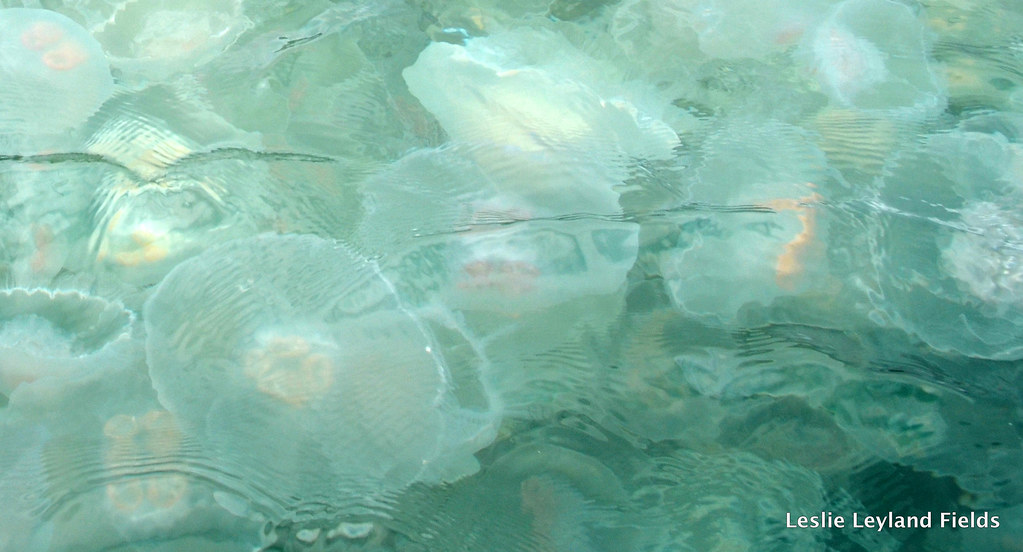
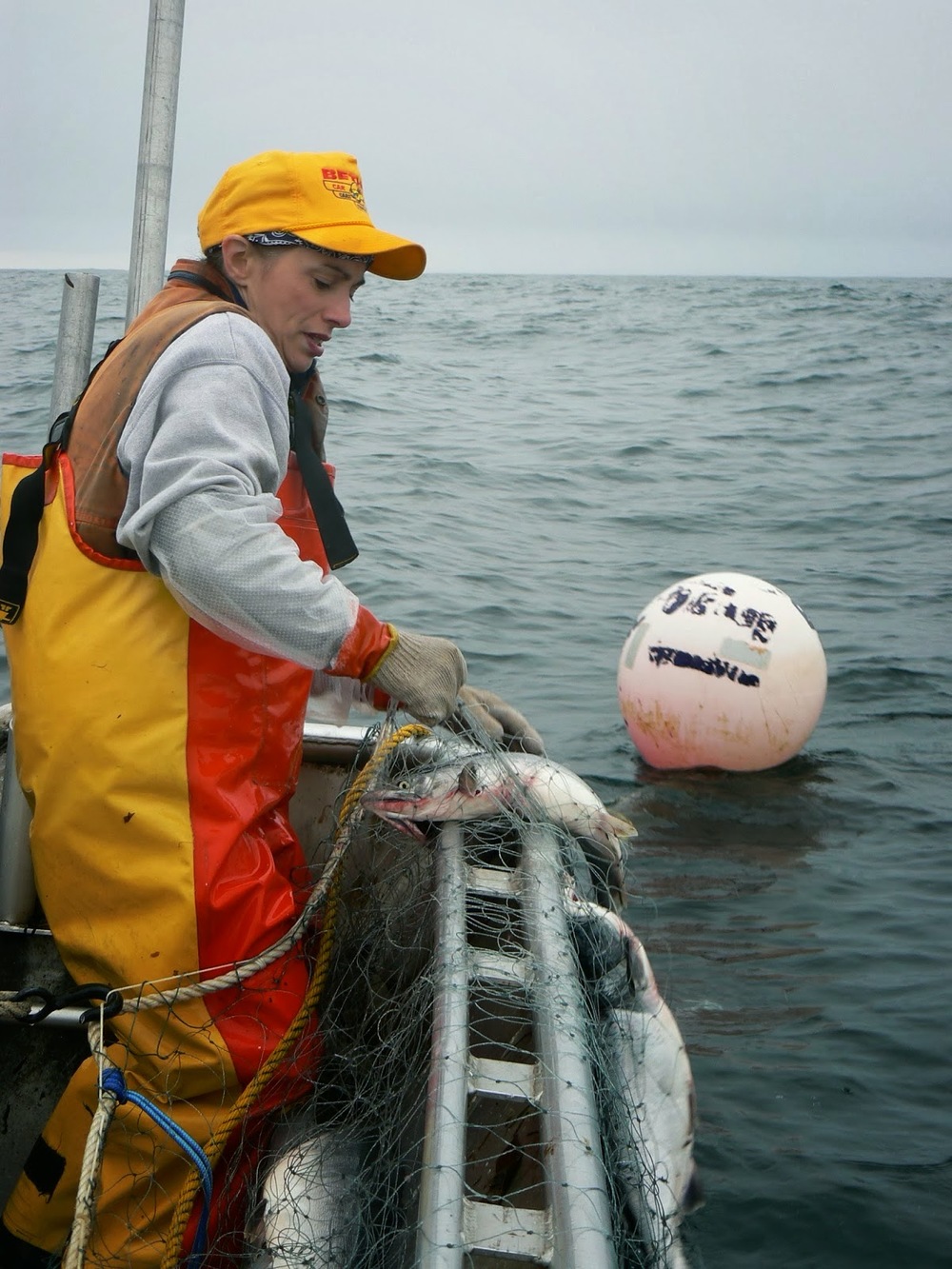
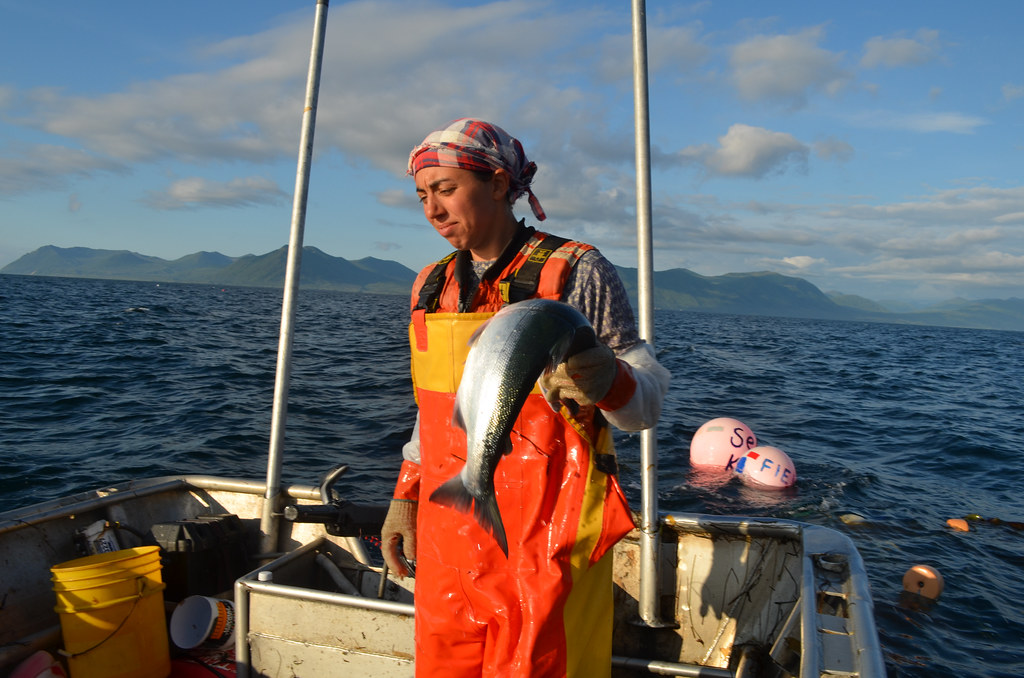

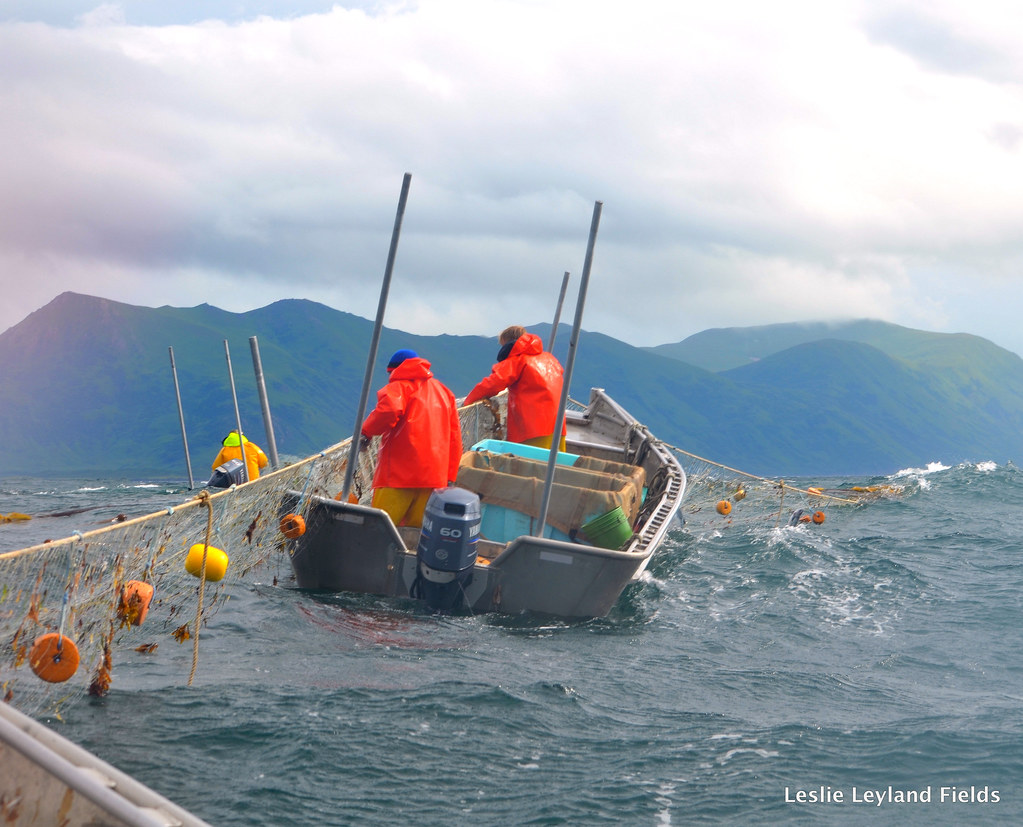
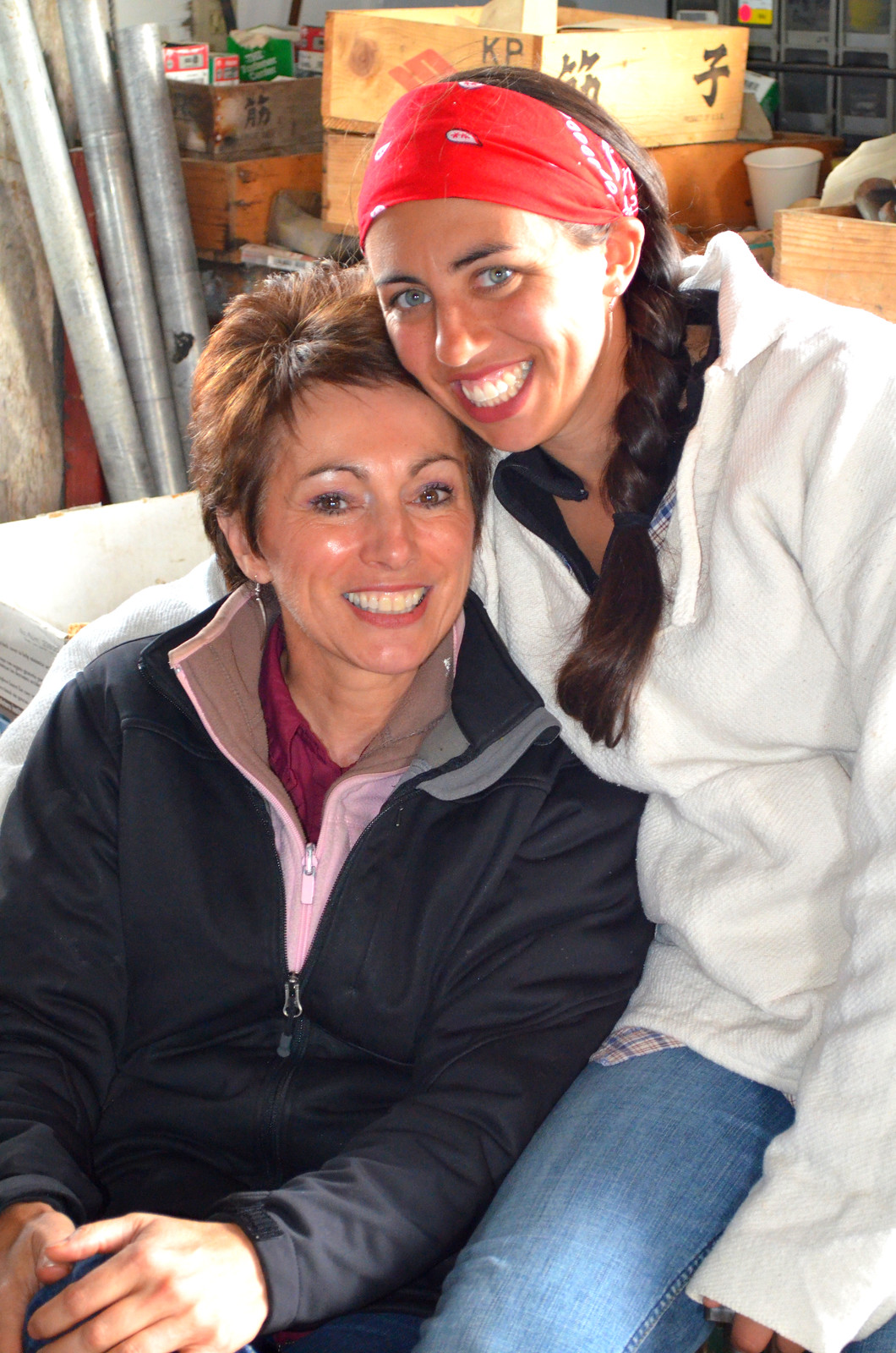
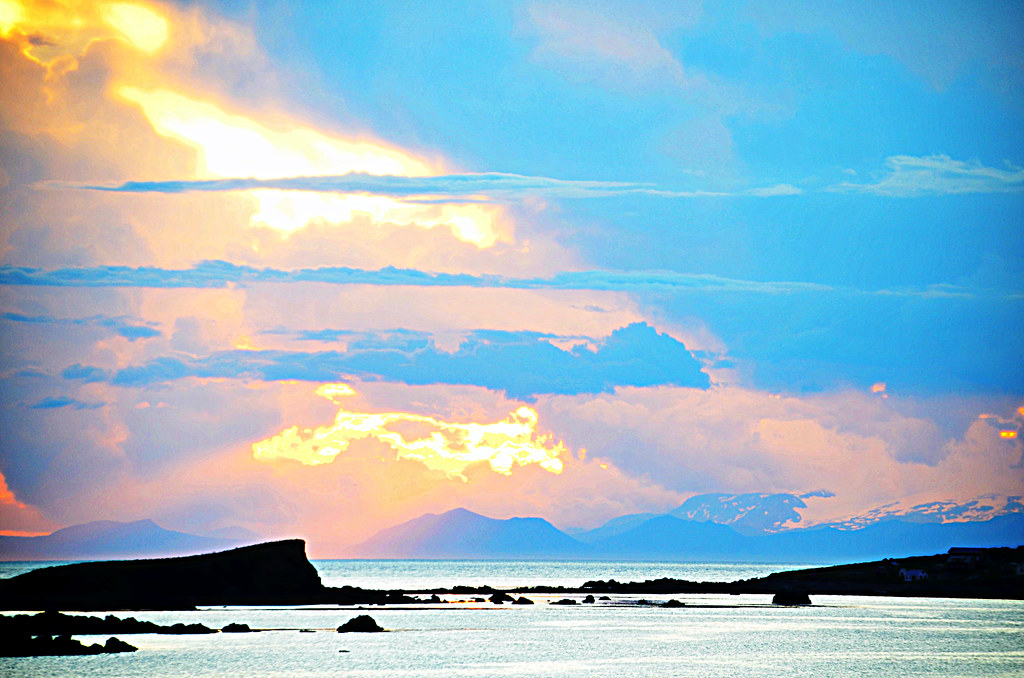
Naphtali, her hair bound in a bandana, her huge green eyes vivid in a deeply tanned face, concentrates on the net. She motors forward through the net, as a steady stream of jellies slop through the bow roller into the skiff, our 26′ open boat.
The floor of the skiff is now just a mass of congealed water and little broken crosses I have to stand on and in.
I don’t mind these. They feel somewhat antiseptic, and even holy, with a holy-ghost body.
But other jellyfish come with them, these giant glops of oranges, pinks, rusts, as large as sinks, even bathtubs at times, their stinging strings like snot trailing behind.
They’re bagged in the net and as we move forward, they’ll slide into the boat, at my feet, and travel the length of the skiff. We lift our hands as they pass, narrow our eyes to protect our faces and skin from errant splashes of acid until each one disappears off the stern with a slurp.
Sometimes one of us will get enough in our eyes to leave the nets and go ashore, slogging painfully up the hill to the house and the medicine shelf, where the eyewash waits.
The tide is twenty-one feet today, which means everything in the water, including us, is stretched taut as wires. We’ll have to muscle through the nets these next few hours, using timing, our weight, every fiber of our biceps and deltoids to get the work done. The other skiffs are manned by men half my age and twice my weight.
Sometimes I look at my daughter and wonder, what have your father and I given to you?
She never wanted to run a skiff. Running a skiff makes you captain of a small ship. You preside over one or two crewmen: their lives are in your hands as you travel your boat straight into convulsed, tide-ripping storms.
In the midst of those storms you have to fish and work as if there were none. Running a skiff means you will work eight to fifteen hours every day through every summer.
It means you will be a girl in a world of men, and expected to work like a man. And so it has been.
But we needed her to run a boat. She needed the money for college.
She couldn’t quit or leave. She did not choose this life. It was chosen for her.
Neither of us will forget the seasons of ache, hurt and fear. Have we given you bread or a stone, daughter? A fish or a serpent? I am not sure.
I don’t know how long she’ll keep returning. When she was seventeen, at the start of the season, she stood before me in her orange raingear, hands clenched. “I can’t do this anymore, Mom.”
I looked at her helplessly. At the end of the previous season, Naphtali’s hands were so swollen from picking countless thousands of fish, when she returned to school she couldn’t hold a pencil. After grad school, maybe she’ll never return. But tonight, as I watch her in the skiff, I am amazed.
On these stormy waters that test the bodies and souls of men, she is competent, strong, fearless.
She tells me what to do in clipped phrases, and I do it, trusting her.
Is it possible that even the stones are a form of abundance?
Is it possible that maybe this world is a place of such surfeit, such unending provision, such upside-down bounty that what is given up and given away is not lost?
I first glimpsed this upside down economy when I raised my hand that day in a white country church and said, “Pick me, Jesus!” and when I followed Duncan here to this island.
The Alaska sky and mountains and sea were so vast and clean, so full of breath and drama my hopelessness was washed away.
And was it the same for them as well, those first disciples? After the wedding in Cana, where Jesus turned water into the finest wine, the disciples followed Jesus to that hillside, where a ward of wounded, sorry, hungry, limping people thronged, and they were healed, the worst and best of them.
They marveled. This teacher did so much more than teach! No other rabbi did this—put hands on bodies and cured them whole!
It was almost too good to be real, too good to trust, but there they were, all these giddy ones healed under his touch. No matter what came next, were they all not healed? Could anyone else have done this, ever? This shouting laughing hillside then must be the “kingdom of God”!
And there I was, just over twenty, in a skiff beside my new husband, the two of us moving from net to net, pulling salmon from the depths of a green sea, fish so glittering our boat sparkled in the sun.
Were we not all clothed as beautifully as the lilies? After every net, Duncan would lean his wet nose down to mine and kiss me, so glad I was now part of his world. And I kissed him back, this man who smelled of salt water and fish. I kissed him back.
Me, this girl learning how to love, becoming a wife and a fisherman and maybe even a follower of Jesus all at the same time.
Those fishermen and the other followers did not know yet what would come of their new life.
They did not know exactly what this new kingdom would look like.
They had some ideas. They knew the scrolls. They knew they were the persecuted and reviled.
They prayed daily for God to return to His people and to restore their nation’s fortunes and power.
Nothing like that had happened yet, but already they were glad. Glad! Wine and healing! Dancing and running! Teachings with authority!
All of us—the disciples, me, my daughter, all of us who raise our hands, who move our feet, who walk behind or beside Him, there we are on the sea, in a boat, or on the hillside running with new sturdy legs marveling—what is this new place?
Even a wedding won’t run out of wine, and a man who could be the Messiah tells us all to “ask, seek and knock,” that our Father will give us gifts just for the asking.
Can heaven really be this open and this close?
And look, my daughter, at all that you can do.
Look at all I have done and am not done doing.
In this new kingdom, even with stones in our pockets, cannot a jellyfish, or even a snake—still bring life?
Have we not all been given bread and fish after all?
Crossing the Waters: Following Jesus through the Storms, the Fish, the Doubt and the Seas is Leslie Leyland Fields’ tenth book. Others include Forgiving Our Fathers and Mothers, and The Spirit of Food. When she isn’t fishing, speaking or writing, you’ll find her on her island picking rose petals for jam or creating a new recipe with her favorite food—Alaska salmon.
In Crossing the Waters, you’ll be swept up in a fresh experience of the gospels, traveling with the fishermen disciples from Jesus’ baptism to the final miraculous catch of fish―and also experiencing Leslie’s own efforts to follow Christ out on her own Alaskan sea. In a time when so many are “unfollowing” Jesus and leaving the Church, Crossing the Waters delivers a fresh encounter with Jesus and explores what it means to “come, follow Me.” This book does not disappoint but profoundly delivers.
[ Our humble thanks to Tyndale for their partnership in today’s devotion ]


